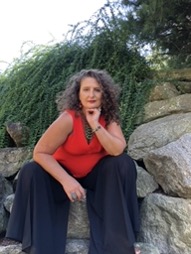
Hi! I’m Dr. Rita Sinorita Fierro from Fierro Consulting, LLC. I started the firm in 2008 and ever since then, I’ve had the honor of having several organizational development professionals as friends and colleagues. Three of them were Black women. Their unique understanding of the interplay of systemic racism and leadership culture in organizations shifted my understanding of evaluation and how to look at results.
At the time, I was still using linear logic models and using them as theories of change:

My colleagues taught me that the organizational development field uses a different theory of change:

The theory of change I work from these days is more like this image below: change happens from the inside/out. This doesn’t mean that what leaders do is the only thing that impacts communities, but their leadership plays an important role on how their organizations and projects contribute (whether positively or in terms of harm) to the communities they intend to serve.

When my blindspots were revealed, I shifted how I practiced program evaluation. I began asking leaders how they saw the project furthering their personal leadership goals and what legacy they wanted to leave behind. Just as the strengths of leaders can be seen in the projects they lead, their blindspots show up as well.
Blindspots like cultural dominance, disregard for land, lack of respect for elders and community power will reinforce the status quo and the injustices of colonization and oppression. I’ve seen leaders, who claimed to want social justice results, sabotage the work, because they didn’t have the maturity, vision, courage, or culture to sustain the discomfort of the process of change and transformation.
Founder’s intentions and blindspots become seeds and embed themselves in the of organizational culture producing fruits even when most people have forgotten their origin. When internalized white supremacy drives our leadership in the form of safety, control, or saviorism, and support sabotage the social change work. Overcoming internalized white supremacy is an ongoing process.
This AEA365 week, scholars from around the world, mostly who have published on these topics, write about blindspots, values, and domination, and how decolonizing our world requires us to decolonize our minds and actions first:
- Shama Dossa & Sadaf Shallwani draw from a chapter they wrote to highlight some ways program evaluation can dismantle the white gaze.
- Andrea Nelson Trice, PhD, draws from her book, on ways to articulate our values as a path to decolonization;
- Christopher Hall, MSW, PhD speaks about ways that white evaluators can shift the perception of our role from allies to accomplices;
- Susan M. Wolfe draws from her book on community consulting, to identify colonizing assumptions in project design
- Katie Boone offers a framework from her article (in process of publication), on how to work in a trauma-informed way centering place in the community-building process in a way that favors reconciliation from her work with the Dakota nation in her land of ancestral trauma.
- Linda Khumalo & Gert Van Hecken draw upon Linda Khumalo’s publication on decoloniality and power in Made in Africa Evaluation (MAE) to talk about Knowledge hierarchies in Made in Africa Evaluation
Enjoy your reading this week! And enjoy the AEA conference in Indianapolis!
Rad Resources
Igniting Inspiration: cool book on how organizational culture generates different results.
In my book Digging Up the seeds of white Supremacy, I came up with a methodology to identify the seed/intention in each single-system. The research revealed the seeds of safety, control, or saviorism at the foundation of 10 single-systems (Control: economic, immigration, criminal justice, education; Safety: health and legal systems; Saviorism: child welfare, welfare, mental health, juvenile justice). Because these seeds are deeply embedded in the tree of white supremacy–our whole society–whenever we operate from fear we are, in fact, nourishing the tree.
The American Evaluation Association is hosting Decolonization in Evaluation Week with some of our colleagues. Do you have questions, concerns, kudos, or content to extend this AEA365 contribution? Please add them in the comments section for this post on the AEA365 webpage so that we may enrich our community of practice. Would you like to submit an AEA365 Tip? Please send a note of interest to AEA365@eval.org. AEA365 is sponsored by the American Evaluation Association and provides a Tip-a-Day by and for evaluators. The views and opinions expressed on the AEA365 blog are solely those of the original authors and other contributors. These views and opinions do not necessarily represent those of the American Evaluation Association, and/or any/all contributors to this site.

Hello Rita,
I loved this post and would like to use the concept in a slide I plan to share at a workshop but would like to get your permission if possible. I am not sure how best to connect with you, so I am trying this. If you receive this message, please let me know!